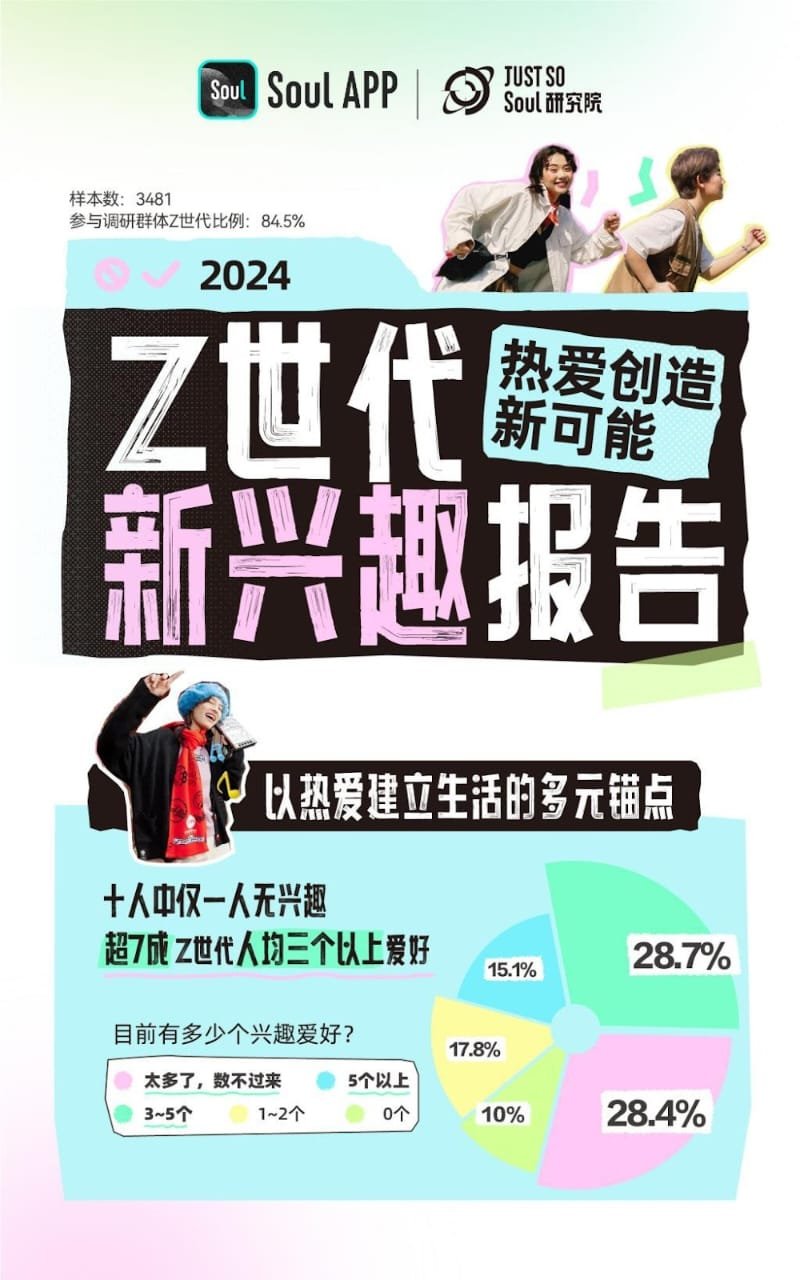A recent survey conducted by Soul App, which involved around 3500 platform users, revealed the multi-faceted relationship that Zoomers have with their interests. The definition of hobbies has evolved significantly, for Gen Z individuals who are no longer treating their interests as just something fun to do.
These youngsters are integrating their hobbies into their emotional lives, social networks, and even career paths. This multi-faceted relationship with their interests points to a profound shift in how hobbies are perceived and practiced in today’s world.
Given their digital savviness, awareness of global issues, the heightened professional competition they face, and the fragmented social structures around them, Zoomers face unique pressures. So, they tend to seek refuge in their hobbies which provide them with the balance they need to cope with the stress of everyday life. Simply put, whether youngsters are engaging in creative activities like painting or practical hobbies like hiking, hobbies have become a crucial tool for emotional well-being.
So, when almost 90% of Soul App’s survey participants stated that they have at least one hobby, it was an expected finding. But, the next figure was a bit astonishing as almost 70% of the respondents stated that they had three or more hobbies. In other words, these users admitted to investing a significant amount of both time and money into their interests.
From the perspective of mental health, hobbies offer an outlet for self-expression and a structured way to disconnect from daily stressors. Niche interests such as anime fandoms, DIY crafting, and gaming offer a deeper layer of emotional fulfillment. These hobbies allow Gen Z to express their creativity in ways that feel authentic and personal, further helping to build emotional resilience.
But, the benefits of hobbies aren’t just limited to a sense of fulfillment and engagement. In an era where physical gatherings are increasingly replaced by digital interactions, hobbies have emerged as a significant medium for building and maintaining social relationships.
According to the report from Soul App, Gen Z is using their hobbies as a gateway to meet new people, both online and offline. The data showed that, on average, young people make around 6 new friends through shared interests. Of the survey participants, more than 20% said that they had met over 10 new people via their hobbies.
Digital platforms, especially those like Soul App, have played a pivotal role in facilitating these social connections. Nearly 50% of the respondents said they used online platforms to meet like-minded people who share their hobbies. So, it’s clear that Gen Z is actively seeking out communities built around common interests. Such communities frequently transcend geographical barriers yet they present the perfect environment to form meaningful relationships.
Interestingly, this trend extends beyond online interactions. Gen Z is also leveraging their hobbies to build offline connections by attending events like anime conventions, DIY craft markets, or outdoor adventure meetups.
These gatherings allow youngsters to deepen their bonds with fellow hobbyists and build long-lasting friendships. In fact, it would not be off the mark to conclude that hobbies have become a primary method through which Gen Z forms deep and enduring social connections in a world that is increasingly isolating.
Another striking observation made in Soul App’s report was that Gen Z is willing to invest significant financial resources into their interests. This is in stark contrast to the ways of previous generations, who typically viewed hobbies as low-cost activities.
According to Soul’s report, the average young person spends around 1,645 yuan per month on hobbies. Also, 60% of the respondents indicated that they do not prioritize cost when it comes to supporting their interests, with 8.33% stating that they are entirely unconcerned about how much they spend if the hobby is something they’re passionate about.
So, it is obvious that Gen Z does not view hobbies merely as entertainment but as valuable investments in their emotional, social, and even professional lives. That said, the emotional rewards that hobbies provide often justify the financial commitment, which explains why this generation is willing to allocate up to a quarter of their monthly income for activities like anime merchandise, outdoor gear, or art supplies.
But another justification is also the potential for turning an interest into an income stream. Certainly no strangers to hustle culture, many youngsters have found a way to monetize their interests. For instance, around 10% of the respondents of Soul App’s survey stated that they’ve earned money through their hobbies.
Taking this further, more than 12% of the respondents of Soul App’s 2024 Gen Z New Interests Report said that they have successfully turned their hobbies into full-time careers. In particular, professions like avatar creation and selling fan art are becoming popular avenues for earning.
Actually, this transition from hobbyist to professional is especially prevalent in niche hobbies, such as Coser (costume players). The fact that they have a ready buyer base in interest-specific communities like those on Soul App certainly helps.
Also, Gen Z is extremely comfortable being a part of the gig economy. This mindset also helps youngsters to explore the potential of hobbies as primary or at least significant sources of income. For instance, one individual who participated in the survey admitted making a whopping 50,000 yuan per month by monetizing his hobby.
In a nutshell, Soul App’s survey underscored the fact that the rise in hobby culture among Gen Z signals a broader societal shift in how personal interests are valued. No longer relegated to the periphery, hobbies are becoming essential to the way young people navigate life. And this point was driven home further by the fact that 42.4% of the young respondents said they’ve maintained long-lasting friendships through their hobbies, while 57.6% highlighted the emotional and mental health benefits of engaging in these activities.
